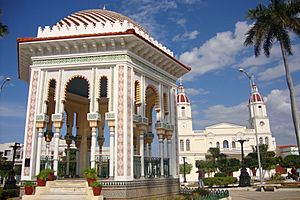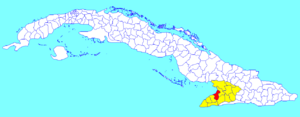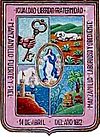Manzanillo, Cuba facts for kids
Quick facts for kids
Manzanillo
|
||
|---|---|---|

The Glorieta of Manzanillo
|
||
|
||

Manzanillo municipality (red) within
Granma Province (yellow) and Cuba |
||
| Country | Cuba | |
| Province | Granma | |
| Established | January 6, 1840 | |
| Area | ||
| • Total | 498 km2 (192 sq mi) | |
| Elevation | 25 m (82 ft) | |
| Population
(2022)
|
||
| • Total | 123,542 | |
| • Density | 248.08/km2 (642.5/sq mi) | |
| Demonym(s) | Manzanillero/a | |
| Time zone | UTC-5 (EST) | |
| Postal code |
87510
|
|
| Area code(s) | +53 23 | |
| Website | https://www.manzanillo.gob.cu/es/ | |
Manzanillo is a lively city and a special area (called a municipality) in Cuba's Granma Province. It's one of the biggest cities in Cuba. What makes it unique is that it's the most populated city in the country that isn't a provincial capital.
Contents
Geography of Manzanillo
Manzanillo is a port city located in eastern Cuba. It sits right on the Gulf of Guacanayabo. This gulf is close to where the Cauto River flows into the sea. Getting to the city by sea can be a bit tricky. This is because of the beautiful coral reefs around Cayo Perla.
Areas of Manzanillo
The Manzanillo area is divided into different parts. Some parts are within the city itself. These are called barrios like Primero and Segundo. There are also many country areas. These rural communities include places like Blanquizal and Jibacoa.
History of Manzanillo
Manzanillo was first established in 1784. A few years later, in 1792, the city was attacked by the French. To protect the city, a fort was built in 1793.
In 1833, Manzanillo gained its own local council, called an ayuntamiento. In 1837, the Spanish crown gave the city a special title, Fiel. This was because Manzanillo stayed loyal to Spain. In 1827, the port was opened for trade. This meant ships from Cuba and other countries could come and go. Manzanillo was also the site of three battles during the Spanish–American War.
Economy and Industry
The economy of Manzanillo is based on farming and local industries.
Farming in Manzanillo
Farmers in Manzanillo grow many important crops. These include coffee, sugarcane, and rice. They also grow delicious fruits and tobacco. Besides crops, they produce honey and raise cattle.
Local Industries
Manzanillo has several factories and businesses. There are sawmills that process wood. Some factories focus on fish-canning. Other places make molasses from sugarcane. You can also find factories that produce cigars and leather goods.
Natural Resources
The land around Manzanillo also has valuable natural resources. There are deposits of zinc and copper in the municipality.
Population of Manzanillo
In 2022, the city and municipality of Manzanillo had a population of 123,542 people. The total area of Manzanillo is about 498 square kilometers. This means there are about 250 people living in each square kilometer.
Culture and Education
Manzanillo is a place where learning is important. It is home to a part of the University of Granma. This part of the university focuses on medical science.
Transportation in Manzanillo
Getting around Manzanillo and to other cities is easy.
Roads and Highways
The city is connected by a main state highway. This road is called the Circuito Sur de Oriente (CSO). There's also Highway 17, which goes to Las Tunas.
Train Services
Manzanillo has a railway station. It's the end point for a train line coming from Bayamo. You can catch regional trains here. There are also long-distance trains that connect Manzanillo to major Cuban cities. These include Santiago de Cuba, Guantánamo, Camagüey, Ciego de Ávila, Santa Clara, and even Havana.
Famous People from Manzanillo
Manzanillo has been home to several notable people:
- Bartolomé Masó (1830–1907) – A military leader and Cuban patriot.
- Joaquin Ferrer (1929–2022) – A talented painter.
- Rosa Porto (1930-2019) – A baker and businesswoman who became famous in Los Angeles.
- Carlos Puebla (1917-1989) – A well-known singer, guitarist, and composer.
See also
 In Spanish: Manzanillo (Cuba) para niños
In Spanish: Manzanillo (Cuba) para niños


